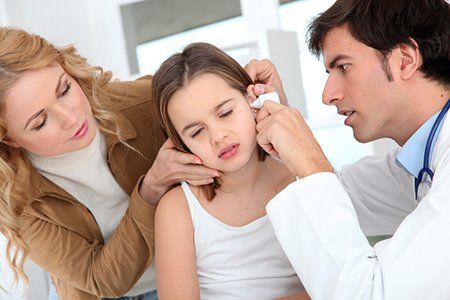Are Your Child's Ear Infections Allergy Related?
Admin • February 27, 2018

A recurring ear infection is a medical condition that many children suffer from — there are more than 30 million cases of ear infections in doctors' offices yearly.
There is a link between ear infections and food allergies in children, which is something you need to talk to your doctor about. Discover how ear infections and food allergies may be related in your child and how to see the signs that your child may have a food allergy that needs their pediatrician's attention.
How Ear Infections and Food Allergies Are Connected
The link between ear infections and food allergies may be caused by excess mucus found in the nasal and ear membranes when food allergies are present. When a child is allergic to a certain food — common allergens include milk, eggs, and corn — the child may show signs of an allergic reaction in a mild way.
The mucus membranes go into overdrive attempting to protect the body from a foreign and unwanted substance, causing a child's nasal and ear cavities to drain. The excess mucus causes inflammation and imbalance in the ear canal, leading to painful, recurring ear infections.
Since ear infections are incredibly common in children, being the second most common reason for a doctor's visit among youth, it can be difficult to make the connection between a simple food allergy and an ear infection in the first place. Watching for signs of a food allergy may help you and your child's doctor make the possible connection between foods and your child's recurring and stubborn ear infections.
Signs of Food Allergies
Not all food allergies are extremely dangerous or even noticeable. Many food allergies are mild, resulting in symptoms you don't even notice. Some allergic reactions to food in your child are actually attributed to something else — a cold, sensitivity to detergents, or hay fever are just some of the diagnoses that are mistakenly attributed to mild food allergies.
Watch your child's food intake closely, especially when they consume dairy products, eggs, wheat, corn, or other common food allergens. Symptoms to watch out for that occur shortly after consumption include the following.
Runny Nose
A runny nose, as mentioned above, is a sign that your child's mucus membranes are overactive in response to a food substance your child's body is unable to process or handle.
Itchy Skin/Hives
Itchy skin or a rash near your child's mouth or on their neck can be a sign they have food allergies. Your child may also get small bumps or hives on their skin where they have touched certain foods.
Ear/Throat Infections
Irritation in the nasal cavities, throat, or in the inner ear can occur with mild food allergies.
Following your child’s consumption of certain foods, write down all of their symptoms, how long their symptoms last, and the type of food they ate when their symptoms occurred. If you suspect food allergies in your child, whether you believe their recurring ear infections to be congruent to their symptoms or not, ask their pediatrician if your child can be referred to an allergy specialist
for further testing.
Allergies and ear infections appear to be linked, and knowing if your child has food allergies in the first place can help explain why your young one gets ear infections so often. An allergy specialist will test your child for allergies and prescribe a treatment plan to bring relief to your child if food allergies are found to be present.
Many children have ear infections with or without food allergies. To find out if your child's ear infections are related to an allergy in your child, contact our specialists at the Allergy and Asthma Clinic of Fort Worth for a consultation today.
If your sinuses bother you weeks after you have gotten over a cold, you may have developed sinusitis. If you think you have this condition, keep reading.
Do you suffer from ear allergies? Do something about your allergy-related ear issues with these frequently asked and answered questions.
If you think you might suffer from a sun allergy, learn about what sets it off, possible treatment options, and strategies to keep your symptoms at bay.
If you have noticeable trouble gathering your thoughts or maintaining your alertness, learn how your allergies may create or aggravate your tiredness.






